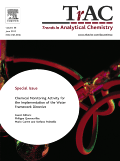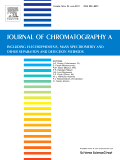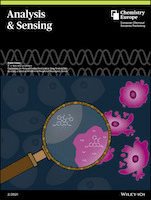
MICROCHEMICAL JOURNAL
Scope & Guideline
Connecting Researchers Through Groundbreaking Microchemical Studies
Introduction
Aims and Scopes
- Analytical Techniques Development:
The journal emphasizes the creation and enhancement of analytical methods, particularly those utilizing chromatography, mass spectrometry, and electrochemical sensors, to improve the sensitivity and specificity of detections. - Nanomaterials in Sensing:
A significant area of focus is the incorporation of nanomaterials such as carbon dots, metal-organic frameworks, and various nanoparticles in the development of advanced sensors for environmental and biomedical applications. - Green Chemistry Approaches:
The journal promotes sustainable practices in analytical chemistry, including the use of deep eutectic solvents and environmentally friendly extraction techniques to reduce chemical waste. - Biological and Environmental Applications:
Research published in the journal often targets applications in food safety, environmental monitoring, and clinical diagnostics, highlighting the relevance of analytical chemistry in addressing real-world problems. - Interdisciplinary Research:
The journal encourages interdisciplinary studies that combine principles from chemistry, biology, and materials science to tackle complex analytical challenges.
Trending and Emerging
- Smartphone-Assisted Analytical Techniques:
There is a growing trend towards the development of portable, smartphone-based sensors and analytical devices, which facilitate on-site testing and enhance accessibility to analytical methods. - Integration of Machine Learning in Analysis:
The incorporation of machine learning algorithms to improve data processing and interpretation in analytical chemistry is becoming increasingly prevalent, allowing for enhanced accuracy and efficiency. - Advanced Nanomaterial Applications:
Research surrounding the use of novel nanomaterials, such as MXenes and metal-organic frameworks, in sensor development and environmental applications is rapidly expanding. - Multi-Modal Detection Methods:
Emerging studies are focusing on the combination of various detection modalities (e.g., colorimetric, electrochemical, and fluorescence) to improve the sensitivity and specificity of analyte detection. - Biomarker Detection in Clinical Applications:
There is an increasing emphasis on the detection of biomarkers for disease diagnosis and monitoring, particularly in the context of cancer and infectious diseases.
Declining or Waning
- Traditional Chromatographic Techniques:
There has been a noticeable decline in the publication of studies focused solely on traditional chromatographic methods, as researchers increasingly explore more innovative and efficient techniques. - Non-Green Extraction Methods:
Research involving non-sustainable extraction methods is becoming less frequent, with a growing preference for eco-friendly alternatives such as deep eutectic solvents. - Basic Analytical Chemistry:
Papers focusing on fundamental analytical chemistry principles without substantial application or innovation are less common, with a shift towards more applied research. - Single-Technology Studies:
The journal has seen fewer studies that rely solely on a single analytical technology, as multi-method approaches gain favor for their comprehensive results.
Similar Journals

TRAC-TRENDS IN ANALYTICAL CHEMISTRY
Exploring the Frontiers of Analytical InnovationTRAC - Trends in Analytical Chemistry is a prestigious journal published by Elsevier Science Ltd, situated in the Netherlands. With an impressive impact factor reflected in its Q1 rankings across three major categories—Analytical Chemistry, Environmental Chemistry, and Spectroscopy—this journal stands at the forefront of disseminating pioneering research and advancements in the field of analytical chemistry. Established in 1981, TRAC provides a comprehensive platform for researchers to share influential studies and insights related to the latest trends, methodologies, and technologies in analytical techniques. Recognized globally, the journal excels in fostering cross-disciplinary dialogue and innovation, making it an indispensable resource for academics, professionals, and students alike. Explore the latest issues to stay abreast of cutting-edge developments that shape the analytical sciences.

Journal of Analysis and Testing
Elevating standards in analytical and environmental science.Journal of Analysis and Testing is a premier academic journal published by SPRINGER SINGAPORE PTE LTD, dedicated to advancing the fields of analytical and environmental chemistry. With ISSN 2096-241X and E-ISSN 2509-4696, the journal has established a significant presence since its inception in 2017, converging its focus until 2024. The journal's outstanding rankings in 2023, including Q1 quartile placements in Analytical Chemistry, Instrumentation, and Spectroscopy, underscore its pivotal role in disseminating high-quality research. Researchers can access cutting-edge studies that explore innovative testing methodologies, electrochemical analyses, and material evaluations, making it an essential resource for professionals and students alike. The Journal of Analysis and Testing not only celebrates advances in science and technology but also promotes interdisciplinary collaborations, ensuring widespread impact across analytical and environmental domains. As such, this journal plays a vital role in shaping the future of analytical practices and methodologies, positioning itself as a key conduit for knowledge exchange in the scholarly community.

ATOMIC SPECTROSCOPY
Exploring Innovations in Molecular Analysis.ATOMIC SPECTROSCOPY is a distinguished journal specializing in the field of spectroscopy and published by ATOMIC SPECTROSCOPY PRESS LTD. With ISSN 0195-5373 and e-ISSN 2708-521X, this journal has been a cornerstone in advancing the discipline since its inception, thriving in its relevant domain for over four decades, covering converged research years from 1980 to 1989 and from 1996 to 2024. Currently holding a Category Quartile of Q2 in Spectroscopy for 2023, ATOMIC SPECTROSCOPY ranks 34th among 76 in its field according to Scopus, placing it in the 55th percentile, thereby affirming its critical role as a resource for researchers, professionals, and students alike. This journal serves as a platform for disseminating innovative research, methodological advancements, and breakthroughs in atomic and molecular spectroscopy, fostering a comprehensive understanding that is essential for progress in analytical chemistry and related disciplines. While it operates under a non-open access model, the journal ensures broad reach and visibility within the academic community. For those passionate about spectroscopy, ATOMIC SPECTROSCOPY remains an invaluable resource for staying updated on the latest developments, contributing to its reputation as a leading journal in the field.

Chemosensors
Empowering Science through Open Access ResearchChemosensors is a distinguished open-access journal published by MDPI, focusing on the innovative field of analytical chemistry and physical and theoretical chemistry. Since its inception in 2013, the journal has rapidly established itself as a pivotal platform for the dissemination of cutting-edge research related to the development and application of chemical sensors, encompassing various methodologies and technologies that contribute to advancements in diagnostics, environmental monitoring, and industrial applications. Based in Switzerland, the journal operates with a commitment to accessibility, ensuring that all published articles are freely available to a global readership. With a current impact factor that positions it in the Q2 quartile for both Analytical Chemistry and Physical and Theoretical Chemistry, Chemosensors attracts a diverse audience of researchers, professionals, and students eager to explore new findings and foster collaborative efforts in sensor technology and its applications. As it continues to grow, Chemosensors remains devoted to advancing scientific knowledge and innovation in its field, making significant contributions to the global scientific community through its rigorous peer-review process.

ANALYTICAL AND BIOANALYTICAL CHEMISTRY
Pioneering Innovative Research in ChemistryANALYTICAL AND BIOANALYTICAL CHEMISTRY, published by SPRINGER HEIDELBERG, is a leading international journal that serves as a vital platform for innovative research in the fields of analytical and bioanalytical chemistry. With an impressive impact factor and ranking in the Q2 category for both Analytical Chemistry and Biochemistry, the journal highlights key advancements and methodologies that drive the discipline forward. Established in 1996 and continuing vigorously into 2024, it has gained significant recognition with Scopus rankings placing it in the 83rd and 78th percentiles within its categories, underscoring its impact and relevance. The journal's commitment to open access facilitates widespread dissemination of critical scientific knowledge, making it an essential resource for researchers, professionals, and students dedicated to exploring the complexities of chemical analysis. With its base in Heidelberg, Germany, ANALYTICAL AND BIOANALYTICAL CHEMISTRY continues to inspire and influence the global research community.

JOURNAL OF ANALYTICAL CHEMISTRY
Shaping the Future of Analytical PracticesJOURNAL OF ANALYTICAL CHEMISTRY, published by PLEIADES PUBLISHING INC, stands as a pivotal resource in the field of analytical chemistry, offering an innovative platform for researchers, professionals, and students to advance their knowledge and contribute to the discourse within the discipline. With an ISSN of 1061-9348 and an E-ISSN of 1608-3199, this journal features a focused exploration of analytical methodologies, instrumentation developments, and applications across various domains, contributing to practical and theoretical advancements in the field. Currently ranked in the Q3 category in Analytical Chemistry with a Scopus rank of #111 out of 156, it provides critical insights and innovation strategies for professionals aiming to enhance their analytical capabilities. Access to the journal is through standard subscription models, and it covers an extensive range of topics pertinent to the discipline from 1996 to 2024. Engage with the JOURNAL OF ANALYTICAL CHEMISTRY to be part of a vibrant research community dedicated to push the boundaries of analytical practices.

Food Analytical Methods
Empowering researchers to enhance food safety standards.Food Analytical Methods, published by Springer, is an esteemed journal dedicated to the innovative field of analytical methodologies within the food sciences. With an ISSN of 1936-9751 and E-ISSN of 1936-976X, this journal serves as a pivotal platform for researchers and professionals to exchange insights, methodologies, and findings related to food quality analysis, safety measures, and innovative technologies in food science. As of 2023, Food Analytical Methods boasts impressive Scopus rankings, including Q2 in Analytical Chemistry and Food Science, positioning it among the top journals in its category. The journal's commitment to enhancing food safety and quality through rigorous research underscores its importance in both academic and industrial applications. Although it does not currently operate under an open-access model, it provides exceptional value through its rigorous peer-review process and comprehensive publication standards, further inviting contributions from both established and emerging scientists in the field. With coverage spanning from 2008 to 2024, this journal continues to address critical research areas, thereby shaping the future of food analytics.

JOURNAL OF CHROMATOGRAPHY A
Pioneering Insights in Analytical ChemistryJOURNAL OF CHROMATOGRAPHY A, published by Elsevier, is a leading journal in the disciplines of Analytical Chemistry, Biochemistry, and Organic Chemistry, boasting an impressive 2023 Q2 categorization across multiple fields. With an ISSN of 0021-9673 and an E-ISSN of 1873-3778, this prestigious journal has been at the forefront of chromatography research since its inception in 1958. The journal serves as a vital platform for disseminating high-quality research articles, reviews, and insights into the latest developments in chromatographic techniques and applications, reflecting its standing in the top tier of analytical and organic chemistry literature, evidenced by its impressive Scopus rankings. While it currently operates under a subscription model, the journal continues to make significant contributions to the scientific community by fostering collaboration and innovation in chromatography methodologies. We invite researchers, professionals, and students to engage with the essential findings shared within its pages, which are foundational for advancements in various scientific fields, making it an indispensable resource for enhancing chromatographic knowledge and practice.

Methods and Objects of Chemical Analysis
Exploring the Essentials of Chemical AnalysisMethods and Objects of Chemical Analysis is a significant outlet in the field of Analytical Chemistry, published by the prestigious TARAS SHEVCHENKO NATIONAL UNIVERSITY OF KYIV in Ukraine. Since its inception in 2017, this journal has aimed to advance methodological and analytical understanding within the discipline, addressing contemporary issues and innovative techniques. With a Scopus rank of #133 out of 156 and a Q4 Category Quartile for 2023, it offers a platform for researchers and professionals to disseminate crucial findings and methodologies. While currently serving as a traditional journal, it is fostering an academic community focused on impactful research that enhances our understanding of chemical analysis techniques. The journal’s commitment to scholarly rigor and its relevance in a rapidly evolving field make it a valuable resource for students and seasoned researchers alike, seeking to remain at the forefront of analytical advancements.

Analysis & Sensing
Unveiling Insights Through Precision AnalysisAnalysis & Sensing is a prominent academic journal published by WILEY-V C H VERLAG GMBH, focusing on the critical fields of Analytical Chemistry, Electrochemistry, Spectroscopy, and Biochemistry. Established within the converged years from 2021 to 2024, the journal aims to advance knowledge in analytical and sensing techniques, providing a platform for high-quality research that reflects current trends and challenges in the scientific community. With a Scopus ranking that highlights its credibility—ranking 101st in Analytical Chemistry and 43rd in Electrochemistry—the journal caters to researchers, professionals, and students striving to enhance their understanding of analytical processes and methodologies. Although not open access, the quality of the articles published ensures a rigorous peer-review system, making it a vital resource for those who wish to remain at the forefront of research innovation in analytical sciences. Additionally, its global reach, indicated by its effective dissemination and relevance, underscores the journal's significance within the realm of chemical research.